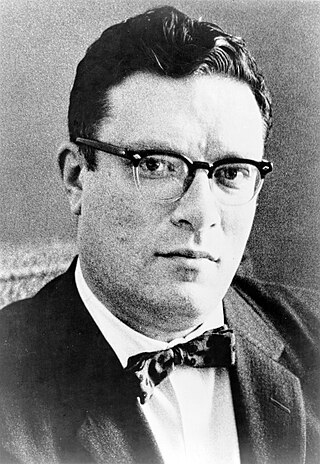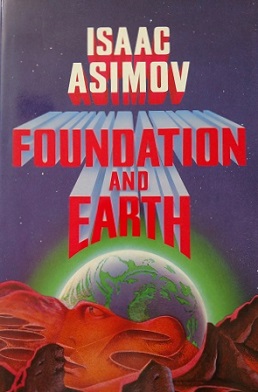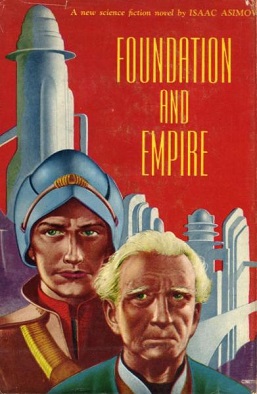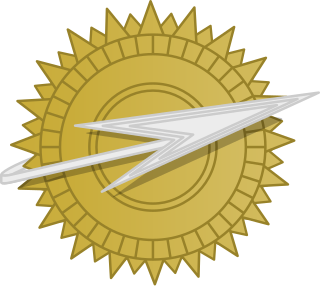
Isaac Asimov was an American writer and professor of biochemistry at Boston University. During his lifetime, Asimov was considered one of the "Big Three" science fiction writers, along with Robert A. Heinlein and Arthur C. Clarke. A prolific writer, he wrote or edited more than 500 books. He also wrote an estimated 90,000 letters and postcards. Best known for his hard science fiction, Asimov also wrote mysteries and fantasy, as well as popular science and other non-fiction.

Star Wars: Episode I – The Phantom Menace is a 1999 American epic space opera film written and directed by George Lucas. It stars Liam Neeson, Ewan McGregor, Natalie Portman, Jake Lloyd, Ahmed Best, Ian McDiarmid, Anthony Daniels, Kenny Baker, Pernilla August and Frank Oz. It is the fourth film in the Star Wars film series, the first film of the prequel trilogy and the first chronological chapter of the "Skywalker Saga". Set 32 years before the original trilogy, during the era of the Galactic Republic, the plot follows Jedi Master Qui-Gon Jinn and his apprentice Obi-Wan Kenobi as they try to protect Queen Padmé Amidala of Naboo in hopes of securing a peaceful end to an interplanetary trade dispute. Joined by Anakin Skywalker—a young slave with unusually strong natural powers of the Force—they simultaneously contend with the mysterious return of the Sith. The film was produced by Lucasfilm and distributed by 20th Century Fox.

Foundation's Edge (1982) is a science fiction novel by American writer Isaac Asimov, the fourth book in the Foundation Series. It was written more than thirty years after the stories of the original Foundation trilogy, due to years of pressure by fans and editors on Asimov to write another, and, according to Asimov himself, the amount of the payment offered by the publisher. It was his first novel to ever land on The New York Times best-seller list, after 262 books and 44 years of writing.

Foundation and Earth is a science fiction novel by American writer Isaac Asimov, the fifth novel of the Foundation series and chronologically the last in the series. It was published in 1986, four years after the first sequel to the Foundation trilogy, which is titled Foundation's Edge.

The Foundation series is a science fiction book series written by American author Isaac Asimov. First published as a series of short stories and novellas in 1942–50, and subsequently in three collections in 1951–53, for nearly thirty years the series was a trilogy: Foundation; Foundation and Empire; and Second Foundation. It won the one-time Hugo Award for "Best All-Time Series" in 1966. Asimov later added new volumes, with two sequels: Foundation's Edge and Foundation and Earth, and two prequels: Prelude to Foundation and Forward the Foundation.
Hari Seldon is a fictional character in Isaac Asimov's Foundation series. In his capacity as mathematics professor at Streeling University on the planet Trantor, Seldon develops psychohistory, an algorithmic science that allows him to predict the future in probabilistic terms. On the basis of his psychohistory he is able to predict the eventual fall of the Galactic Empire and to develop a means to shorten the millennia of chaos to follow. The significance of his discoveries lies behind his nickname "Raven" Seldon.

The Lensman series is a series of science fiction novels by American author E. E. "Doc" Smith. It was a runner-up for the 1966 Hugo award for Best All-Time Series, losing to the Foundation series by Isaac Asimov.

R. Daneel Olivaw, also known as Eto Demerzel and Chetter Hummin, is a fictional robot created by Isaac Asimov. The "R" initial in his name stands for "Robot," a naming convention in Asimov's future society during Earth's early period of space colonization. Daneel is introduced in The Caves of Steel, a serialized story published in Galaxy magazine vol. 7 #1-3 from October to December 1953. The full story was published by Doubleday as a hardcover book in 1954.

Foundation is a science fiction novel by American writer Isaac Asimov. It is the first published in his Foundation Trilogy. Foundation is a cycle of five interrelated short stories, first published as a single book by Gnome Press in 1951. Collectively they tell the early story of the Foundation, an institute founded by psychohistorian Hari Seldon to preserve the best of galactic civilization after the collapse of the Galactic Empire.

Second Foundation is the third novel published of the Foundation Series by American writer Isaac Asimov, and the fifth in the in-universe chronology. It was first published in 1953 by Gnome Press.

Foundation and Empire is a science fiction novel by American writer Isaac Asimov originally published by Gnome Press in 1952. It is the second book in the Foundation series, and the fourth in the in-universe chronology. It takes place in two parts, originally published as separate novellas. The second part, "The Mule," won a Retro Hugo Award in 1996.

Foundation and Chaos (1998) is a science fiction novel by Greg Bear, set in Isaac Asimov's Foundation universe. It is the second book of the Second Foundation trilogy, which was written after Asimov's death by three authors, authorized by the Asimov estate.
Psychohistory is a fictional science in Isaac Asimov's Foundation universe which combines history, sociology, and mathematical statistics to make general predictions about the future behavior of very large groups of people, such as the Galactic Empire. It was first introduced in the four short stories (1942–1944) which would later be collected as the 1951 novel Foundation.

The Galactic Empire is an interstellar empire featured in Isaac Asimov's Robot, Galactic Empire, and Foundation series. The Empire is spread across the Milky Way galaxy and consists of almost 25 million planets settled exclusively by humans. For over 12 millennia the seat of imperial authority was located on the ecumenopolis of Trantor, whose population exceeded 40 billion, until it was sacked in the year 12,328. The official symbol of the empire is the Spaceship-and-Sun. Cleon II was the last Emperor to hold significant authority. The fall of the empire, modelled on the fall of the Roman Empire, is the subject of many of Asimov's novels.
Wanda is a female given name of Polish origin. It probably derives from the tribal name of the Wends. The name has long been popular in Poland where the legend of Princess Wanda has been circulating since at least the 12th century. In 1947, Wanda was cited as the second most popular name, after Mary, for Polish girls, and the most popular from Polish secular history. The name was made familiar in the English-speaking world by the 1883 novel Wanda, written by Ouida, the story line of which is based on the last years of the Hechingen branch of the Swabian House of Hohenzollern. In the United States, Wanda attained its highest popularity in the year 1934, peaking then at No. 47 on the list of names most frequently given to female infants. The name is popularly misinterpreted as meaning "wanderer."
Julian Jay Savarin is a British musician, songwriter, poet and science fiction author.

Lee Grinner Pace is an American actor. He is known for starring as Thranduil the Elvenking in The Hobbit trilogy and as Joe MacMillan in the period drama television series Halt and Catch Fire. He has also appeared in the Marvel Cinematic Universe as Ronan the Accuser, a role he first played in Guardians of the Galaxy and reprised in Captain Marvel. Pace earned a 2008 Emmy nomination for his portrayal of Ned in the comedy-drama Pushing Daisies. Since 2021, he stars as the galactic emperor Brother Day in the television series Foundation, based on the stories of Isaac Asimov.
The Foundation universe is the future history of humanity's colonization of the galaxy, spanning nearly 25,000 years, created through the gradual fusion of the Robot, Galactic Empire, and Foundation book series written by American author Isaac Asimov.
Foundation is an American science fiction streaming television series created by David S. Goyer and Josh Friedman for Apple TV+, loosely based on the Foundation series of stories by Isaac Asimov. It features an ensemble cast led by Jared Harris, Lee Pace, Lou Llobell and Leah Harvey. The series premiered on September 24, 2021. In October 2021, the series was renewed for a second season, which premiered on July 14, 2023. In December 2023, the series was renewed for a third season.











